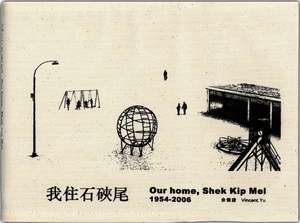Our Home, Shek Kip Mei 1954-2006
Autor Vincent Yuen Limba Engleză Hardback – 31 ian 2010
Shek Kip Mei was the first public housing estate development in Hong Kong built by the British colonial government in 1954. The resettlement project was an immediate response to the need for temporary relief as a result of the massive fire that destroyed the Shek Kip Mei squatter area on Christmas Eve 1953, when over 53,000 Chinese immigrants lost their makeshift homes overnight. However, it was also hailed as a new era for Government public housing programmes and the need to accommodate the rapidly growing population of the 1960s and 70s.
Many Hong Kong citizens share the experience of growing up witnessing the territory’s rapid transformation from a series of rural villages into the present international metropolis. Life on the Shek Kip Mei Estate can, in many ways, be interpreted as a microcosm of wider society. The estate buildings were essentially concrete bunkers lacking the basics of doors and windows, let alone the relative luxury of electricity and running water. A family of five to eight persons was crammed into a cubicle of about 120 - 200 square feet (11 - 18 square metres), with over 10 households sharing a public toilet/bathroom on the same floor… bygone days of communal living.
Intended to be a temporary resettlement, 50 years later the apartments in the Shek Kip Mei Estate are still rented out by the Government. Photojournalist Vincent Yu captured life on Shek Kip Mei Estate through his lens during its last phase of existence, before the oldest blocks were demolished in November 2006. His images document some 200 elderly residents and their ‘homes’ before they were resettled to modern high-rises, many having inhabited the crumbling estate for over five decades.
Many Hong Kong citizens share the experience of growing up witnessing the territory’s rapid transformation from a series of rural villages into the present international metropolis. Life on the Shek Kip Mei Estate can, in many ways, be interpreted as a microcosm of wider society. The estate buildings were essentially concrete bunkers lacking the basics of doors and windows, let alone the relative luxury of electricity and running water. A family of five to eight persons was crammed into a cubicle of about 120 - 200 square feet (11 - 18 square metres), with over 10 households sharing a public toilet/bathroom on the same floor… bygone days of communal living.
Intended to be a temporary resettlement, 50 years later the apartments in the Shek Kip Mei Estate are still rented out by the Government. Photojournalist Vincent Yu captured life on Shek Kip Mei Estate through his lens during its last phase of existence, before the oldest blocks were demolished in November 2006. His images document some 200 elderly residents and their ‘homes’ before they were resettled to modern high-rises, many having inhabited the crumbling estate for over five decades.
Preț: 126.92 lei
Nou
Puncte Express: 190
Preț estimativ în valută:
24.29€ • 25.09$ • 20.20£
24.29€ • 25.09$ • 20.20£
Carte indisponibilă temporar
Doresc să fiu notificat când acest titlu va fi disponibil:
Se trimite...
Preluare comenzi: 021 569.72.76
Specificații
ISBN-13: 9789889926632
ISBN-10: 9889926636
Pagini: 176
Dimensiuni: 178 x 239 x 23 mm
Greutate: 0.48 kg
Ediția:Second Edition
Editura: MCCM Creations
Colecția MCCM Creations
ISBN-10: 9889926636
Pagini: 176
Dimensiuni: 178 x 239 x 23 mm
Greutate: 0.48 kg
Ediția:Second Edition
Editura: MCCM Creations
Colecția MCCM Creations
Notă biografică
Born and raised in Hong Kong, Vincent Yu has worked as a photojournalist covering major news events across the Asia-Pacific region since 1985. As a close observer of Hong Kong’s rapid development, Yu has acquired a special sensitivity towards its ever-changing cityscape. In particular, he is interested in documenting disappearing heritage and architecture as well as communities affected by these changes.
Descriere
Shek Kip Mei was the first public housing estate development in Hong Kong built by the British colonial government in 1954.
